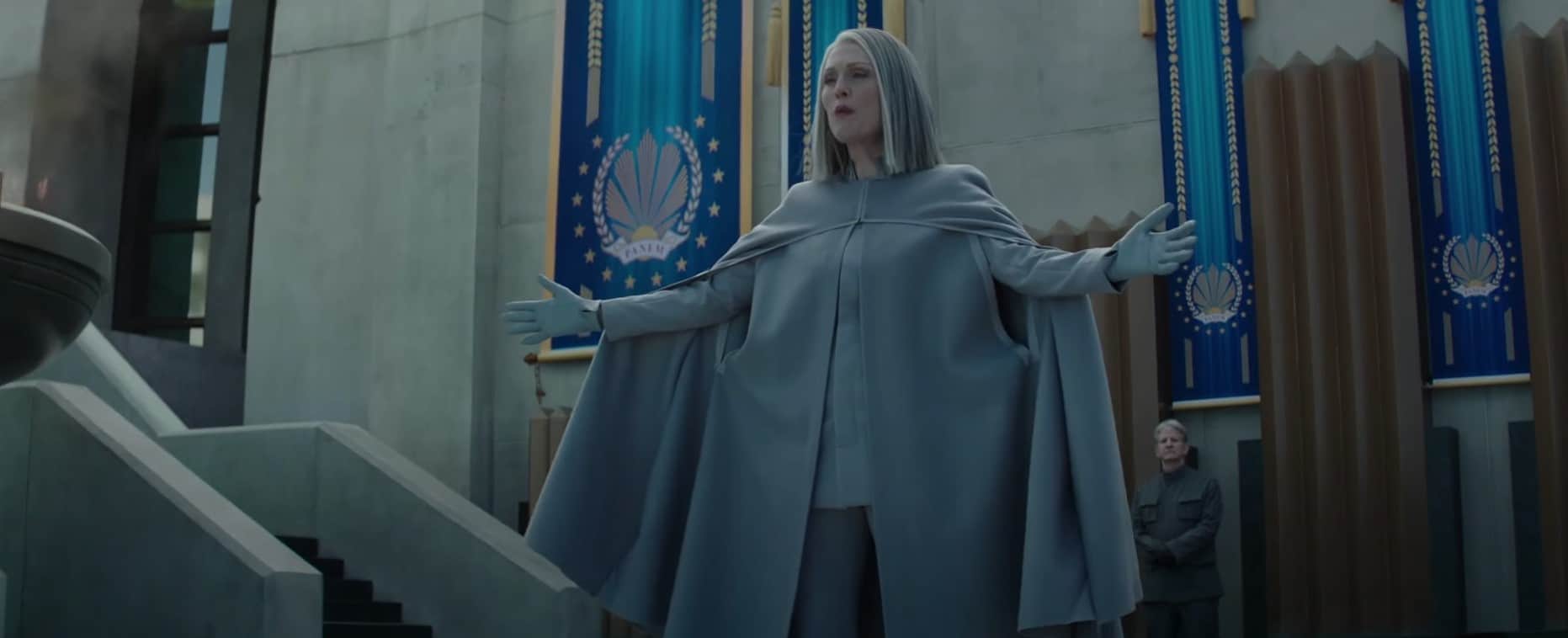Katniss Everdeen’s decision to assassinate President Alma Coin at the end of Mockingjay, the final book in The Hunger Games trilogy, is one of the series’s most controversial and debated events.
After surviving two Hunger Games and becoming the face of the rebellion against the Capitol and President Snow, Katniss is exhausted and traumatized. When the war finally ends, Coin becomes the new President of Panem.
However, Katniss grows suspicious of Coin’s motives and methods, recognizing the similarities between Coin and Snow. Ultimately, she decides to kill Coin for several key reasons.

Why Did Katniss Kill President Coin?
To understand the murder of President Coin a the hands of Katniss, we need to study and put under the magnifying glass some aspects of Katniss’ story character arc development because that decision wasn’t based on any impulse or lazy scriptwriting. Instead, it is the product of a calculated and well-played power play.
Coin’s Power Hunger
Firstly, Katniss realizes that Coin is just as ruthless and power-hungry as Snow. During the war, Coin makes calculated, cold-blooded moves like using Capitol children as human shields and sacrificing her soldiers as martyrs for the cause.
Katniss sees that Coin is willing to do anything to gain control, regardless of morals or ethics. Killing innocents to manipulate public perception reminds Katniss far too much of the games and control tactics that Snow and the Capitol used for decades.
Also Read: The Hunger Games Book And The Movie Differences
Coin Crossed The Line; Katniss Moves To Revenge
Secondly, Coin proposes one final Hunger Games using children of Capitol leaders. After everything Katniss suffered in the games and the war, the idea of yet another sanctioned battle to the death is unthinkable.
Katniss recognizes this as an act of revenge, not justice. It continues the cycle of violence that she has desperately tried to stop. The games were a tool of fear and oppression – for Coin to suggest reinstating them makes Katniss realize Coin is not the revolutionary leader she claimed to be.
Katniss’s Grudge Against Coin
Thirdly, Katniss believes that Coin played a role in the bombing that killed her sister Prim. Whether directly responsible or complicit through inaction, Coin likely knew about and allowed the attack for political advantage.
For Katniss, Prim was the one purely good thing in her life, representing all that Katniss fought for. Her death at the hands of a leader who claimed to fight for freedom pushes Katniss over the edge. Killing Coin is an act of justice for Prim and a way to avenge her meaningless death.

Katniss’s Resentment Fuels Her Revenge
Finally, Katniss realizes that Coin also bears responsibility for Peeta’s torture and mental hijacking by the Capitol. As the rebel leader, Coin failed to protect Peeta, a vulnerable captive.
This compounds Katniss’s distrust and resentment of Coin – she was supposed to be better than the Capitol, yet allowed or ordered the torture of an innocent person close to Katniss.
In the end, Katniss understands that Coin is not actually interested in a peaceful, just society. The Hunger Games is a dystopia full of power plays and scheming. As for President Alma Coin, she is a political operator seeking power and control at any cost. Snow was a tyrant, but he presented Coin with an opportunity to rise as another oppressor under the guise of revolution.
Having lost so much and come so far, Katniss refuses to watch the cycle continue. At great personal cost, she sacrifices Coin for a chance at creating a society built on more than subterfuge.
Katniss gives up her chance for a role in leadership because she recognizes the corruption rooted deep in Coin.
She hopes that Coin’s death might break the system enough to allow real change to take root. Katniss’s assassination of Coin is a symbolic rejection of authoritarianism and power without principle – offering an opening for a new Panem to be reborn for a different, brighter future.
Also Read: Where Are The Hunger Games: Mockingjay Part 1 & Part 2 Filmed? Locations To Know




